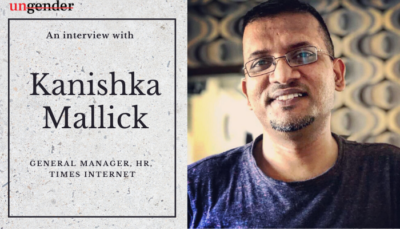By Rajkanya Mahapatra
Any discussion on sexual harassment at the workplace is incomplete without weighing the importance, responsibilities and contributions of the Human Resource (HR) manager. An HR manager must ensure that the organisation complies with the PoSH Act and that employees are made aware that the Internal Complaints Committee exists and how they can reach out to them.
In addition to the specific demands of PoSH compliance, HR managers are also responsible for ensuring that employees, in general, co-exist in a safe space that facilitates productivity. The said safe space would mean a workplace without accessibility issues, without harassment, sexual or otherwise, overt and covert sexism, and discrimination. Calling the HR manager’s job tough would be an understatement. We spoke with Kanishka Mallick, the Head of Talent Acquisition and Lead of Human Resource Business Partner at Times Internet, about a host of things, including how the lockdown has changed the definition of work. We’ve edited his answers for brevity. The entire transcript of his interview is available, here.
Q: How would you describe your experience of building a unique culture for the organisation you’re in? Is it a priority for the organisation?
A: I’ve been with Times Internet for the last nine and a half years now. We’re very uniquely positioned because Times Internet is a digital portfolio management company. We are doing a lot of things in terms of inclusion, diversity, both in terms of gender and otherwise. We’ve been doing a lot especially in the last 4-5 years, and we’ve been doing our jobs silently.
Times – Bennett and Coleman as a group, we want to stay under the radar and continue doing a good job wherever possible. For example, in September 2018, we were in the news for achieving gender pay equality in an independent audit by Aon Hewitt. We were probably the first organisation to adopt Amber – an AI tool in the HR space two years ago. The AI bot reaches out to employees at their fixed tenures and chats with them and gives us a pulse of the organisation at various points in time. What that means is we’ve moved from a situation where we ask people once a year.
Happy to say that we’ve actually increased our hiring percentage for women, it has gone up almost 7% in the last one year. I can probably quote that we’ve achieved an overall increase from 28% to 32%.
In the last couple of years, gender equality and inclusion has become a buzzword and one of the factors to determine an employer of choice. Happy to say that we’ve actually increased our hiring percentage for women, it has gone up almost 7% in the last one year. I can probably quote that we’ve achieved an overall increase from 28% to 32%. We increased our numbers in the tech hiring space too – 25% of all people in the tech product space are women, and the numbers are only going up.
As for the impact of COVID-19, I think hiring has slowed down in most of the organisations. People will take slow and cautious steps. As an organisation, we’ve always been cautious, we’ve been taking things slow and steady, we don’t see a problem maintaining the metrics that we have committed to.

Q: How would you define gender inclusivity and how has the discourse evolved in the last decade?
A: Personally, I think, as human beings, we stereotype things because it helps us justify our own prejudice – that applies to gender equality or inclusivity. For example, as we’re going through this lockdown phase, I’m sure a lot of men are understanding now the relevance of work-from-home where you actually work-FOR-home and work-FROM-home. It was very easy for people like me to walk out of the house at 9 o’clock – forget about what’s happening at home and come back at only 10 to see that things are done. We don’t even realise all that went behind doing all these things to keep things spick and span.
To add to that, if your spouse is working, imagine what he/she is going through – working at home and from home. Now is the time that most people should have had an eye-opener. My definition sees it not as gender but as respect and division of labour. You try and sensitise people towards not the kind of work per se but the effort and time that goes into it.
We don’t even realise all that went behind doing all these things to keep things spick and span. To add to that, if your spouse is working, imagine what he/she is going through – working at home and from home. Now is the time that most people should have had an eye-opener.
Equity vs Equality
Q: How would you differentiate between equity and equality?
A: I think equality is when you do all the superficial stuff – you say that “we are now also doing for women what we have been doing otherwise” – whereas equity means you don’t differentiate – you don’t look at a job as a man’s job. It’s ultimately a job and whoever is worthy of it, whoever is meritorious irrespective of their gender should be getting that job.
Second, in the new age knowledge industry or in the hi-tech industry – it’s about a change in mindset. I would say that’s happening, I wouldn’t say we have reached a very very positive phase but there’s a realisation that things need to change. For example, a couple of months back, there was this news that women will be taken in the front line jobs in the army. Again that’s a mindset change.
Q: Do you think organisations today are more receptive to civil society and media developments than before?
A: There are things that are ‘good to do’ and there are things that are ‘need to do’. For a long time we saw gender equity and equality as ‘good to do’ and not ‘need to do’. In the last 4-5 years, organisations are realising that these efforts are not decorations or ornaments on corporate policies. Why? Because at one end, it is becoming an issue of statutory compliance – hence, we ‘need to do’. Second is the mindset change that has been happening over the last 20 years.
Q: Does Times Internet have a policy that actively checks the possibility of discrimination based on gender?
A: To avoid gender discrimination from a hiring perspective, we’ve removed the gender section on the form. We’ve been trying, in pockets, where we even remove the name of the candidate and share the resume without a name. So that there is no prejudice at all just by seeing a name. Yeah, a lot of people just by looking at a name will say, “yeh ladki hai, achcha I don’t know, I am not sure.” So, we just remove that.
We first ask that the resume be shortlisted. The other thing is from a reward perspective. We reward the recruiter who hires the most women. Secondly, we focus not just on the recruiter. We started something a year ago – where we track which panel hires the most women. Because, there are business agnostic panels. For example, if there’s a tech person being hired for a certain skill set, only if the candidate goes through this panel are they assessed in any other business. So those panels do not hire for a business, they just hire a good talent and it goes straight into the pipeline. We are tracking how they are looking at gender, from a selection perspective. I think we are taking small small steps, so to say.
To avoid gender discrimination from a hiring perspective, we’ve removed the gender section on the form. We’ve been trying, in pockets, where we even remove the name of the candidate and share the resume without a name. So that there is no prejudice at all just by seeing a name. Yeah, a lot of people just by looking at a name will say, “yeh ladki hai, achcha I don’t know, I am not sure.”
Workplace Safety
Q: What does Times Internet do to make the workplace safer and welcoming for women?
A: The first thing we implemented last year – not that we were not doing it earlier – but it was more manual than anything. Now, there is a visitor management system where visitors cannot enter the premises without a photograph and a visitor card. The moment he or she punches in their details, an SMS goes to the employee that a visitor has arrived for them. Only if they approve and press OK on the link is when the person moved from the ground floor to the respective floor of the employee. Of course, I am not saying that it’s only for women but that it especially helps women.
The second is about travel. After 8 o’clock on any day, women are free to ask for a cab and if she is alone, an escort is provided up to the doorstep. If there is another woman or another employee travelling on the same route, even then an escort is an option.
Q: What about infrastructural provisions like availability of sanitary napkins, access to medicines, etc?
A: On every floor, we have a breakout zone. Just to give you an idea, our Gurgaon office has seven floors where the ground floor is the reception and the facility area, plus the rear side has the parking. The entire first floor is the cafeteria which can seat almost 2000 people at any given point in time. From the second floor onward are the office floors. Every floor has a breakout zone.
A breakout zone has a first aid kit available; a medical room at the ground floor is also available which functions with a nurse on an 8-hour duty. Here, basic medication and first aid among other issues can be taken care of. All sanitary and maternity utilities are available for people. There is also a doctor who comes once a week. For mental health, we have a counselling service for everyone, but women can also obviously utilize it. About three months ago, we have empanelled a health app for our employees to take advantage of.

Workplace and Parenthood
Q: How does Times Internet take care of its mothers?
A: There are two aspects to it. One is statutory compliance. We obviously comply with the Maternity Benefit Act. We allow, in that it’s not written but we follow it as a culture, employees who are to-be parents to work from home. It’s not just about mothers but about fathers too. Our policy clearly covers maternity, adoption and surrogacy – all three for parents. Because we do not have a creche in-house, we reimburse creche and day care expenses up to a certain limit for all parents and kids up to the age of five years.
Q: You mentioned that there’s work-from-home for to-be parents? At what point does that phase start? What about paternal leaves?
A: Maternity benefits kick in anytime 84 days before and after. We don’t differentiate from that perspective, it can kick in any time the woman wants to take it up. We are absolutely flexible. It depends on the deliverables of the employee. If the work deliverables are not impacted and in a way there’s an arrangement between the lady and the manager and they are comfortable doing what they discuss, there is no mandate around it. Number one.
Number two, there is paternal leave that the father gets for 5 days when they have a child, and that again, is absolutely flexible. They can take it three days before the delivery and two days after or two days before and three days after or five days before or five days after. That is absolutely flexible between the parent and the manager.
There is paternal leave that the father gets for 5 days when they have a child, and that again, is absolutely flexible.
Also, our leave policies are very flexible. We’ve 41 days of leave which are 21 days of privileged leaves, 10 days of casual leaves and 10 days of sick leaves. Every employee has this plus 10 days from the list of optional holidays. Hence, the parent is absolutely open to utilize these leaves whichever way they want. The flexibility helps.
Q: What do you think are qualities that people working with talent should inculcate? And finally, how can young or aspiring HR professionals do their jobs better?
A: There has to be a respect for labour. Results may or may not happen. If you start respecting efforts, that’s where things start changing. That’s when team members start looking at managers differently and the manager starts looking at team members differently.
And the HR that can help drive that change. What happens in reality is far from this. We have to start saying that the Manager is the HR manager for a team. They are called ‘people managers’ for a reason. Not because they run people as slaves but because they are the HR managers. I think that mindset has to change.
The new, fresh HR folks have to start talking to their stakeholders. Ideally you should not need an HR, your manager should be able to handle 90% of what the HR is supposed to do. The 10% of it, of course, is a lot of administrative work which is part of the payroll attendance, etc. which comes under the HR’s purview but it’s a specialized job. That part, of course, we can and will do, but what HR managers should do is focus on organisational development and work for cultural development and change.
A lot of the time people start devaluing their own jobs because they are told to do so. I think the difference is that a lot of jobs are tangible and measurable and others are not.
Third and the most critical, in my limited experience that I have had so far, and especially HR, is that if we ourselves don’t value our jobs, then nobody else will. A lot of the time people start devaluing their own jobs because they are told to do so. I think the difference is that a lot of jobs are tangible and measurable and others are not. It is up to the individual to quantify their job and not up to the organisation to quantify the job. If as an individual you can quantify your job and present it logically, half your battle is won.
This interview was edited for length and coherence.
The above interview is an attempt to extend our learnings from our advisory work at Ungender to industry leaders. Our Team specialises in advising workplaces on gender centric laws including implementation of Sexual Harassment of Women at Workplace (Prevention, Prohibition and Redressal) Act, 2013
Write to us at contact@ungender.in to understand how we can partner with your organisation to build a more gender compliant and inclusive workplace.








